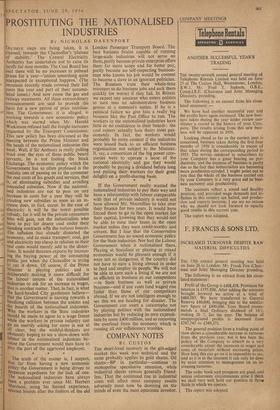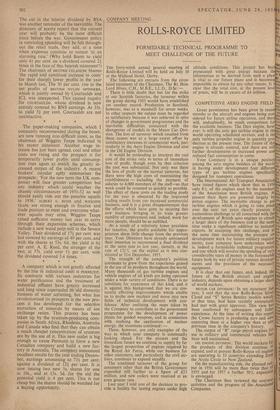COMPANY NOTES
BY CUSTOS Tim short-lived recovery in the gilt-edged market this week was technical and the same probably applies to gold shares. Oil shares—BP in particular—continue to monopolise speculative attention, while industrial shares remain generally friend- less. That the continued rise in industrial costs will affect most company results adversely must now be dawning on the minds of even the most optimistic investor.
The cut in the interim dividend by BSA was another reminder of the inevitable. The directors of BOOTS report that the current year will probably be the most difficult since before the war. Government policy in restricting spending will be felt through- out the retail trade, they add, at a time when expenses continue to mount 'at, an alarming rate.' (Why hold Boots to yield only 41 per cent. on a dividend covered 24 times in the face of this bearish statement?) The chairman of BRITISH CELANESE blames 'the rapid and continual increase in costs' for their sharply lower profits in the year to March last. The 50 per cent. rise in the net profits of BRITISH NYLON SPINNERS, which is jointly owned by Courtaulds and ICI, was unexpected. This caused inquiry for COURTAULDS, whose dividend is now entirely covered by BNS earnings. At 35s. to yield 54 per cent. Courtaulds are not unattractive.
The paper-making companies, which I constantly recommended during the boom, are now running into difficult times, as the chairman of Wiggins Teape indicated in his recent statement. Another wage in- crease has just been agreed, coal and other costs are rising and the prospect is for temporarily lower profits until consump- tion rises again to match the greatly in- creased output of the industry. A recent brokers' circular aptly summarises the prospects: 'For the new term the UK com- panies will . face greater competition but any industry which could weather the chaotic circumstances of 1951-52 so well should easily ride out the possible squalls in 1956.' ALBERT E. REED and WIGGINS TEAPE are strong enough in finance and trade position to meet and overcome what- ever squalls may arise. Wiggins Teape raised sufficient money last year to carry through their expansion schemes, which include a new wood pulp mill in the Severn Valley. Their dividend of 171 per cent. was last covered by earnings of 49 per cent. and with the shares at 53s. 6d. the yield is 61 per cent. A. E. Reed, the stronger of the two, at 57s. yield over 51 per cent. with the dividend covered 3.4 times.
* * * A company which is not greatly affected by the 'rise in industrial costs is PERMUTIT. Its contracts with various industries for water purification and the treatment of industrial effluent have greatly increased and long since superseded its old domestic business of water softening, but what has revolutionised its prospects is the new pro- cess it has developed for the selective extraction of minerals by means of ion exchange resins. This process has been taken up by the uranium-producing com- panies in South Africa, Rhodesia, Australia and Canada who find that they can obtain a much cheaper concentration of uranium ore by the use of it. This new outlet is big enough to cause Permutit to form a new Canadian company and build a new fac- tory in Australia. The company announced excellent results for the year ending Decem- ber, earnings amounting to 734 per cent. against a dividend of 121 per cent. It is now issuing two new 5s. shares for one at 10s., and at 15s. 3d. for the old the potential yield is 4 per cent. This is not cheap but the shares should be watched for a buying opportunity.



































 Previous page
Previous page